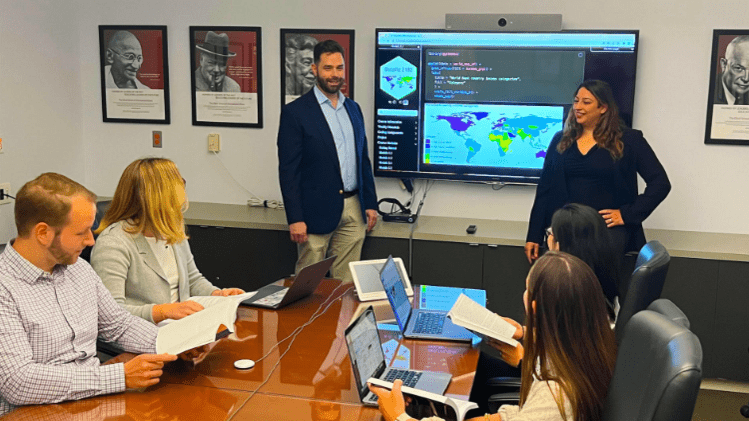

Data Analytics for Policy Professionals
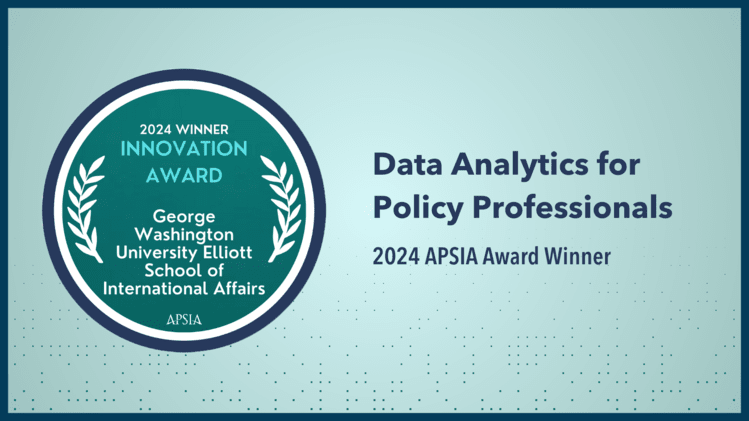
"The ability to take data – to be able to understand it, to process it, to extract value from it, to visualize it, to communicate it – is going to be a hugely important skill in the next decades."
Hal Varian
Chief Economist at Google
Data Analytics for Policy Professionals is a program for professionals of all ages, aimed at bridging the gap between data science and traditional analysis in international affairs and public policy. The ability to bridge data skills with job-specific knowledge is increasingly in demand across the public, private, and non-profit sectors. Our curriculum responds to these exact needs and was developed in consultation with federal agencies including The U.S. Department of State, The Department of Labor, The Foreign Service Institute, and The National Security Council, as well as think tanks and industry leaders such as fp21 and GDIT. It offers flexible weekend course options and is taught by ESIA’s world-class faculty.
Any one DAPP course (1.5 Credits)
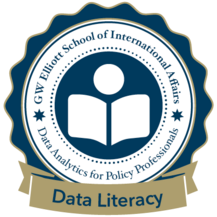
Data Literacy Badge
Any two DAPP courses (3.0 Credits)
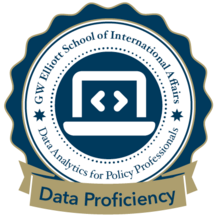
Data Proficiency Badge
Any three DAPP courses (4.5 Credits)
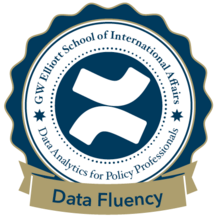
Data Fluency Badge
Any four DAPP courses (6.0 Credits)
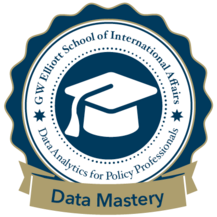
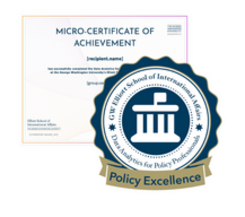
Data Mastery Badge
We offer a range of upskilling courses designed to complement rather than supplant traditional policy analysis. We aim to empower policy professionals in their current roles and promote policy excellence through mastery of basic data science skills. But we also understand that the definition of “mastery” is relative. For some, mastery may entail simply understanding the basic intuition behind a given technique or skill, whereas for others it will involve developing a fully functional model or application. We therefore strive to be inclusive by offering courses targeted at learners with different skill sets while ensuring that every student in every course learns something new.
To bridge data science with international affairs and public policy
To upskill domestic and foreign policy practitioners from data literacy to proficiency, fluency, and mastery to achieve policy excellence
To revolutionize policy through evidence-based approaches that combine content expertise with analytic skills
*Please note that the 1.5 credit DAPP courses are for non-degree students only. Current ESIA students are not eligible to take the 1.5 credit DAPP courses (listed as IAFF 6505). Several of these courses will be offered simultaneously as one-credit ESIA skills courses under IAFF 6502 or IAFF 6503. Current ESIA students must enroll in the one-credit versions of these courses (IAFF 6502 or IAFF 6503). Please contact [email protected] for more information about data analytics course offerings for current ESIA students.
How to ApplyTo apply, go to the application portal and select 'I am a graduate or non-degree student.' You will be prompted to create a username, confirm your email address, and then create a password. Once these steps are completed, you will be able to log in and start a new application.
In addition to completing the application (no application fee required), please make sure to attach
All application materials are due by the deadline listed below the first course you wish to enroll in.
ESIA has partnered with Accredible, an industry-leading platform for issuing and managing secure digital credentials and badges. All ESIA credentials and badges are.
Students who complete courses will receive digital badges of achievement to reflect their successful completion. Upon successful completion of four courses, students are eligible to receive a graduate micro-certificate of achievement reflecting a 6-credit credential in "Data Analysis for Policy Practice" issued by the Elliott School of International Affairs at the George Washington University.
IAFF 6505 Research and Data 101 (March 2024)
Level: Beginner
Perfect for: Senior Leaders of analytic teams; Data Novices. If you don’t have any background knowledge in data but would like to better understand the data outputs from your team, this is the class for you!
Dates/Times: Friday, March 22, 5:10 - 8 PM; Saturday, March 23, 9 AM - 4 PM; Saturday, March 30, 9 AM - 4 PM; Networking Event Friday, May 3, 5:30 - 8:30 PM
Asynchronous work start date (tentative): Saturday, March 16
Apply by: Monday, March 4, 11:59 EST
Credits: 1.5 credit
Professor: Leonardo Antenangeli and Laila Sorurbakhsh, ESIA
Skills learned: No-code introduction to data and its uses, asking the “Right Questions”
Format: In-person
Description: In this course, participants will learn the basics of data, its uses, and what goes into data modeling. Learn to facilitate collaboration between policy analysts and data scientists for data-informed policy development, evaluate and interpret analyses and give feedback to improve modeling and forecasting, provide real-world context to models provided by data scientists, communicate policy scenarios based on data visualizations and predictive models, and utilize modern data-driven tools to evaluate policy and program success.
IAFF 6505 Communicating Data with Web Apps (April 2024)
Level: Intermediate/Advanced
Perfect for: Students with R backgrounds looking for a challenge and a new skill!
Dates/Times: Saturday, April 20, 9 AM - 5 PM; Saturday, April 27, 9 AM - 5 PM; Networking Event Friday, May 3, 5:30 - 8:30 PM
Asynchronous work start date (tentative): Saturday, April 6
Apply by: Monday, March 25, 11:59 EST
Credits: 1.5 credit
Professor: Emmanuel Teitelbaum, ESIA
Skills learned: R-Shiny
Format: In-person
Description: Interactive apps and dashboards are becoming popular ways to convey data to non-statistical audiences. This introductory course on Shiny Apps is tailored for participants interested in transforming their data visualizations into interactive experiences. You'll learn how to empower users to engage with your data, enabling them to derive their own insights in a way that would not be possible with traditional static visualizations. A fundamental part of the course will be understanding reactivity in Shiny, a key element that makes dynamic user interaction possible. We'll start with simple apps focusing on a single visualization and gradually progress to more complex applications with multiple inputs and, ultimately, to creating comprehensive dashboards. Prior knowledge of R is recommended for course participants.
IAFF 6505 Survey Design for Public and International Policy (June 2024)
Level: Beginner/Intermediate
Perfect for: Anyone who uses surveys to collect data or uses survey data to inform decision-making or policy.
Dates/Times: Saturday, June 8, 10 AM - 4 PM; Friday, June 14, 5:10 - 8 PM; Saturday, June 15, 10 AM - 4 PM
Asynchronous work start date (tentative): Saturday, May 25
Apply by: Sunday, May 12, 11:59 PM
Professor: Eric Kramon, ESIA
Skills learned: R/RStudio
Format: In-person
Description: Learn to develop surveys the right way to maximize the accuracy of your research. This course will cover all aspects of survey design and implementation, including different approaches to sampling (random sampling, stratified sampling, cluster sampling, non-probability sampling), the construction and use of survey weights, survey question design, tradeoffs involved in decisions about different survey modes, and analysis and visualization of survey data. Throughout, we will use R/RStudio to learn and practice the coding skills required to implement these various aspects of the survey process.
IAFF 6505 Data Analysis and Visualization Using Tableau (June 2024)
Level: Beginner
Perfect for: Code-hesitant learners who want to make pretty charts and graphs!
Dates/Times: Saturday, June 22, 9 AM - 5 PM; Sunday, June 23, 9 AM - 5 PM; Sunday, June 30, 9 AM - 5 PM
Asynchronous work start date (tentative): Saturday, June 15
Apply by: Sunday, June 2, 11:59 PM
Professor: Paul Albert, ESIA
Skills learned: Tableau, Basic Data Communication
Format: In-person
Description: I have some data, now what. This foundational skills course is geared toward students looking to develop data skills using Tableau. Students will work hands-on with Tableau (free Academic License) to analyze several datasets and create various types of visualizations. Along the way, students will be challenged to think about how their visualizations can be improved to communicate their ideas and findings more clearly. While the course is meant to be a gentle introduction to Tableau, even students who already have some experience in Tableau will find the course rewarding. Not only will this course help you build the necessary skills for evidence-based policy formulation, but it will also make you more marketable. Tableau and data communication skills are in high demand among employers and can help set you apart in your professional career.
IAFF 6505 Expert Foreign Policy Decision-Making Using Data (July 2024)
Level: Beginner
Perfect for: Beginners who have never coded in R before, but are looking for low-stakes, hands-on, guided instruction. Also good for Senior Managers who want to understand what goes into data modeling behind-the-scenes.
Dates/Times: Friday, July 26, 5:10 PM - 9:00 PM; Saturday, 27 July, 9 AM - 4 PM; Saturday, August 3, 9 AM - 4 PM
Asynchronous work start date (tentative): Sunday, July 14
Apply by: Sunday, June 30, 11:59 PM
Professor: Leonardo Antenangeli, PhD
Skills learned: R/Posit
Format: In-person
Description: This course blends the “how” with the “why”: Why do we need to learn data analysis for the practice of foreign and domestic policymaking, and how do these skills add value to the quality of policy we produce and implement? This course will not only help you familiarize yourself with the R programming language and R Studio integrated development environment (IDE), but it will also discuss how these skills can be used to benefit strategic policy thinking and expert-level decision making. Statistical analysis is critical for effective, evidence-based policy making, and R counts itself among the highly sought after skills in the policy realm. R is an open source, analytic tool that benefits from several contributions (“packages'' or “libraries”) made by independent researchers. In this class you will learn the fundamentals needed to create effective R scripts, run basic analyses, and troubleshoot (or debug) your code.
IAFF 6505 Digital Development: Monitoring and Evaluation (September 2024)
Level: Beginner
Perfect for: Those interested in global development, and in learning a new tool to track progress
Dates/Times: Friday, September 6, 5:10 PM - 8 PM; Saturday, September 7, 9 AM - 2 PM; Sunday, September 8, 5:10 PM - 8 PM; Friday, September 13, 5:10 PM - 8 PM; Saturday, September 14, 9 AM - 2 PM; Sunday, September 15, 5:10 PM - 8 PM
Asynchronous work start date (tentative): Thursday, August 22
Apply by: Monday, August 12, 11:59 PM
Professor: Aasit Nanavati
Skills learned: Exclusive access to DevResults software
Format: In-person
Description: The importance and rise in technology innovation in the international development space has brought about new solutions to complex problems and created challenges for successful program implementation. Students will explore the opportunity technology plays as a catalyst for social impact and sustainability across the development landscape. The course will introduce students to the DevResults platform along with practical implementations of technology solutions from leaders within the field.
IAFF 6505 Experiments for Impact Evaluation (September 2024)
Level: Beginner
Perfect for: Creative types who can envision new datasets that don’t yet exist!
Dates/Times: Saturday, September 21, 10 AM - 3 PM; Friday, September 27, 5:10 PM - 8 PM; Saturday, September 28, 10 AM - 5 PM
Asynchronous work start date (tentative): Thursday, September 5
Apply by: Monday, August 26, 11:59 PM
Professor: Eric Kramon, PhD
Skills learned: R, Experimental Design
Format: In-person
Description: Learn how to design experiments to accurately measure your impact. This course will cover the key aspects of experimental design and analysis of experimental data, and teach you how to address challenges that are often confronted in experimental research (such as attrition, spillover effects, and ethical questions). By the end of the course, you will have an experimental design and data analysis plan ready for implementation.
IAFF 6505 International Business Data with PowerBI (October 2024)
Level: Beginner
Perfect for: Code-hesitant learners who want to make pretty charts and graphs!
Dates/Times: Thursday, October 24, 5:10 PM - 8 PM; Friday, October 25, 5:10 PM - 8 PM; Saturday, October 26, 9 AM - 4 PM
Asynchronous work start date (tentative): Friday, October 11
Apply by: Monday, September 30, 11:59 PM
Professor: Anthony Adoleke
Skills learned: Excel, PowerBI
Format: In-person
Description: In this course, International Business Data with PowerBI, you'll embark on a journey to master the essentials of data visualization and cleaning techniques using Power Query. Learn the art of creating compelling visualizations, enabling you to communicate business insights effectively. Dive into the intricacies of Power Query to skillfully clean and shape international datasets, ensuring the accuracy and reliability of your analyses.
Level: Beginner/Intermediate
Credits: 1.5 credit
Professor: Emmanuel Teitelbaum, ESIA
Skills learned: R, Tidyverse
Description: The ability to visualize your data is a fundamental skill increasingly required in virtually every professional or academic context. Data visualization is a key first step of any compelling statistical analysis, but frequently a good visualization can be in and of itself enough to persuade your audience of your main point. If a picture is worth a thousand words, then how many regression tables is a well-crafted plot worth? In this class, we will learn to create a variety of visualizations including line charts, bar charts, scatter plots and maps with the Tidyverse group of packages in the R programming language. We will use ggplot2 to create bar charts, line charts, scatter plots, and choropleth maps. The class will explore how to make interactive maps with popups and markers using the leaflet package. Along the way, we will learn to utilize a number of Tidyverse packages including dplyr and tidyr to wrangle data into the correct form for visualization. Examples will be pertinent to the field of International Affairs and we will learn to use packages that enable us to download data from social science APIs like the Varieties of Democracy (V-Dem) dataset and the World Bank. We will also host a guest lecture connecting the work you do in this class to the work you do as an international affairs or public policy practitioner.
IAFF 6505 Mapping Data: GIS for Presentations
Level: Beginner/Intermediate
Credits: 1.5 credit
Professor: Adam Wunische, ESIA
Skills learned: Geospatial Analysis, QGIS
Description: In this course, students will further their knowledge and understanding of how to use geographic information systems (GIS) or mapping software as used in international security and conflict studies. This course will start with installation and initial setup of the GIS program QGIS. It will then explore how GIS is used in conflict studies and the major advantages it provides over non-spatial datasets and analysis. It will then explore the different types of data that can be used in GIS and how to load and manipulate the data. Students will learn how to do basic analyses of the data and produce simple maps for publications.